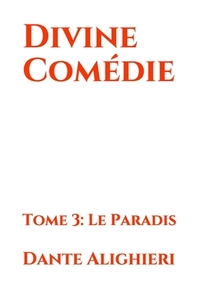Take a photo of a barcode or cover
I went through Hell (and Purgatory and Heaven) to finish this. It actually wasn't that bad; Dante was a brilliant poet and the fact that he wrote cantos in terza rima while beautifully expressing his ideas is unbelievable. I only wish I knew all of his contemporary politicians in order to understand some of his reasoning.
go through inferno, thats enough for a reread. i wasnt missing much having forgotten it.
challenging
dark
emotional
mysterious
reflective
sad
slow-paced
challenging
dark
slow-paced
Plot or Character Driven:
N/A
Strong character development:
No
Loveable characters:
No
Diverse cast of characters:
Yes
Flaws of characters a main focus:
No
I'll admit it: that fourth star is out of relief that I finally finished this.
Still, I did like reading it, to a certain extent. This verse translation is pretty good. To bad the best part is at the beginning (hell), and it gets more boring towards the end (paradise). I'm not religious, so all this praising of God and fawning over Beatrice gets a bit dull. Also, expect to learn way more about mediaeval Italian politics that you'd ever want to know.
Still, I did like reading it, to a certain extent. This verse translation is pretty good. To bad the best part is at the beginning (hell), and it gets more boring towards the end (paradise). I'm not religious, so all this praising of God and fawning over Beatrice gets a bit dull. Also, expect to learn way more about mediaeval Italian politics that you'd ever want to know.
What I liked about it: The Inferno is fun, with lots of imagery of the punishments various sinners, including a pope who was involved in an incident in which various nobles couldn't decide who the next pope should be and ended up appointing three, each of whom immediately excommunicated the others. In the Inferno, he's face-down in a hole with his feet being burnt. But just like the bible, it's much more fun to dream up tortures for people than it is to think about how awesome paradise would be. Also, after a few cantos of torture, you've kind of got it. It's hard to imagine anyone who isn't a serious book nerd or a literary historian getting much pleasure out of Purgatory or Paradiso.
What I didn't like about it: I had been led to believe that this is one of THE great works of western literature and if you're serious about reading, you must put this on your list. As a consequence, I expected it to be good, like Faust. Instead, it's a mostly boring list of what happens to Dante's friends and enemies in the afterlife. Unless you're up to date about 14th century Florentine politics or you have a superhuman ability to remember who is a Guelph and who is a Ghibelline and which one Dante is, it's very hard to see why anyone would be interested in vast sections of this book.
omnibrowbooks.blogspot.com
What I didn't like about it: I had been led to believe that this is one of THE great works of western literature and if you're serious about reading, you must put this on your list. As a consequence, I expected it to be good, like Faust. Instead, it's a mostly boring list of what happens to Dante's friends and enemies in the afterlife. Unless you're up to date about 14th century Florentine politics or you have a superhuman ability to remember who is a Guelph and who is a Ghibelline and which one Dante is, it's very hard to see why anyone would be interested in vast sections of this book.
omnibrowbooks.blogspot.com
adventurous
dark
funny
mysterious
reflective
medium-paced
Plot or Character Driven:
N/A
Strong character development:
No
Loveable characters:
No
Diverse cast of characters:
No
Flaws of characters a main focus:
Yes
Read my full review of The Divine Comedy on Keeping Up With The Penguins.
The Divine Comedy is a quasi-autobiographical poem (that reads like a book for the most part) about 14th century Florentine man Dante’s “journey” through the three realms of the dead (Hell, Purgatory, Heaven). It makes sense, then, that it’s divided into three parts, each containing 33 cantos and an introduction (a canto is something like a chapter, I think – I don’t know much about poetry, don’t @ me). I had mixed feelings about this one, making it hard to give a star review, because Inferno (the first part) was GREAT! Hilarious, engaging, entertaining, loved it... only things started to go downhill in Purgatorio, and Paradiso really stank. In sum, I'd say pick up a copy of Inferno and read that, but you can safely give the rest of it a miss.
The Divine Comedy is a quasi-autobiographical poem (that reads like a book for the most part) about 14th century Florentine man Dante’s “journey” through the three realms of the dead (Hell, Purgatory, Heaven). It makes sense, then, that it’s divided into three parts, each containing 33 cantos and an introduction (a canto is something like a chapter, I think – I don’t know much about poetry, don’t @ me). I had mixed feelings about this one, making it hard to give a star review, because Inferno (the first part) was GREAT! Hilarious, engaging, entertaining, loved it... only things started to go downhill in Purgatorio, and Paradiso really stank. In sum, I'd say pick up a copy of Inferno and read that, but you can safely give the rest of it a miss.
adventurous
challenging
dark
informative
mysterious
reflective
fast-paced
Plot or Character Driven:
Plot
Strong character development:
No
Loveable characters:
No
Diverse cast of characters:
Yes
Flaws of characters a main focus:
Complicated
Will likely reread this one a couple of times








